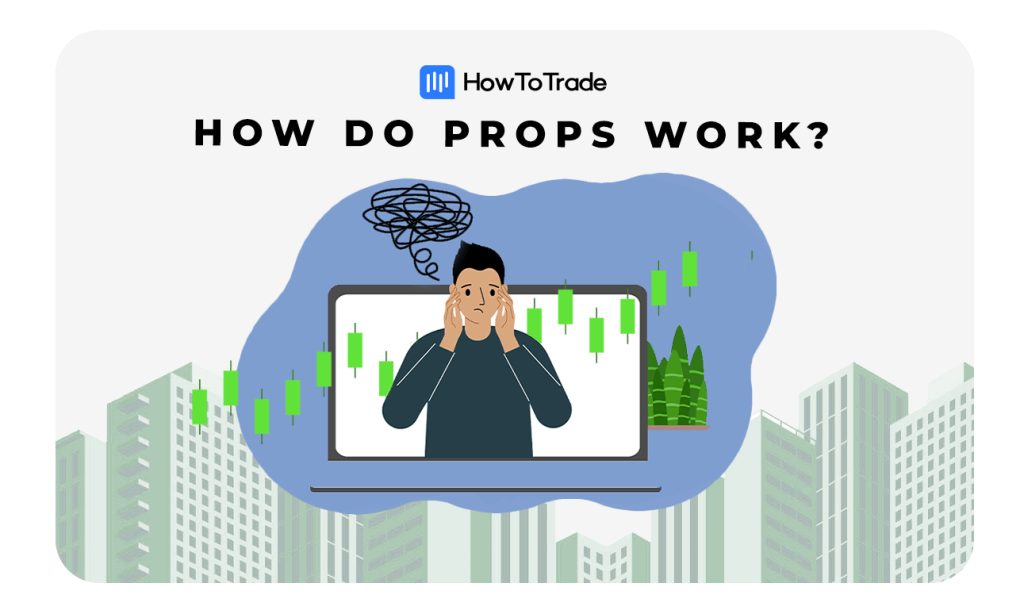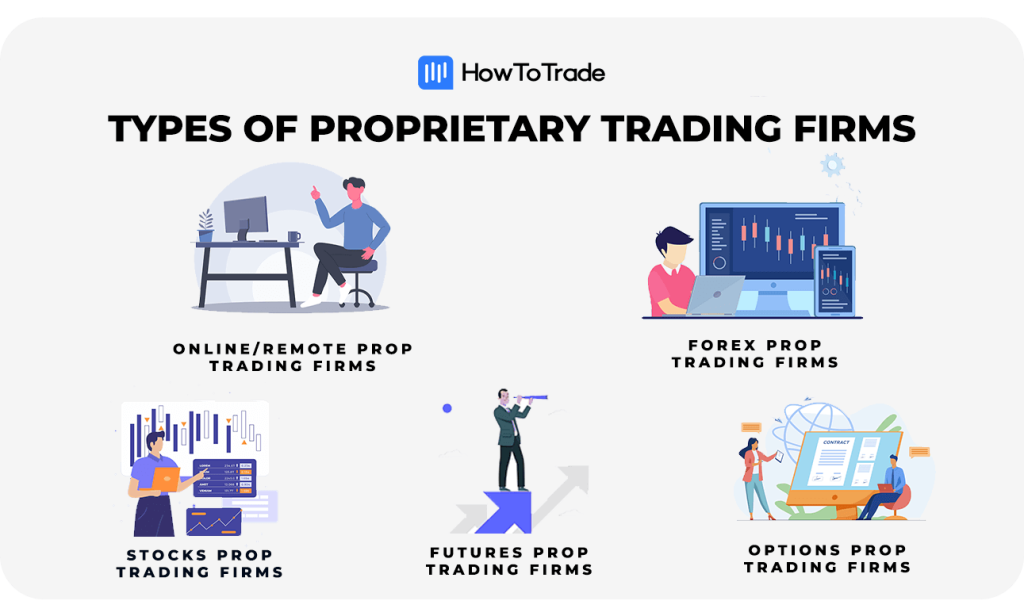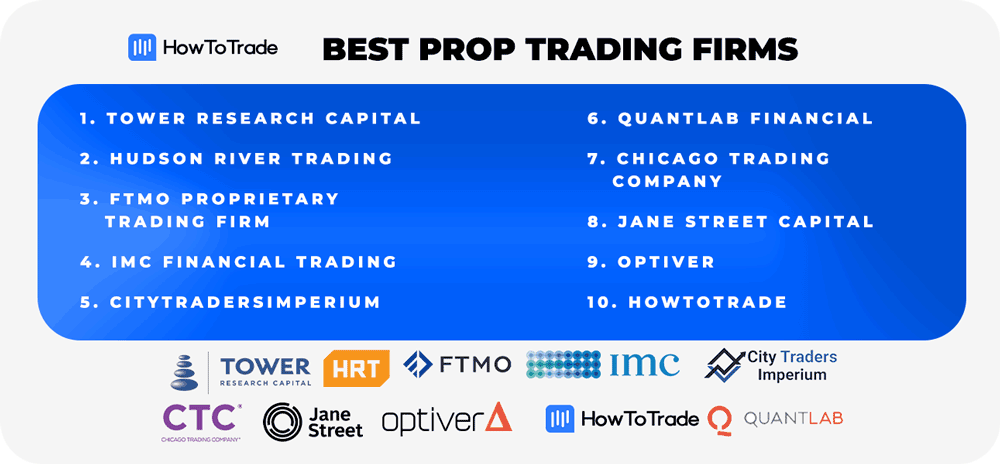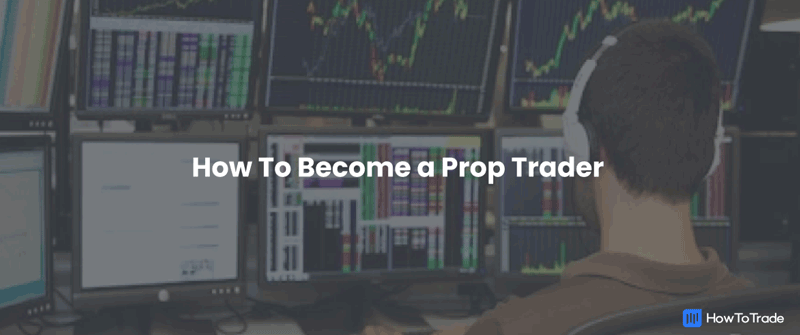
- A proprietary trading firm typically refers to an investment bank or a large establishment that trades its own capital through skilled financial market traders.
- Types of proprietary trading firms include online prop firms, forex or stocks prop firms, options prop trading firms, and crypto prop firms.
- Proprietary trading firms offer an excellent opportunity to build a trading career. They offer free training, large sums of capital to trade with, and top-notch trading platforms and tools.
Proprietary trading firms offer an attractive way to enter the financial markets by offering new and experienced traders more trading capital than they would normally have access to, low-fee structures, and trading training.
But what are proprietary trading firms? How do you join them? And how do you find the best-funded trading account to build your trading career? In this article, we’ll answer these questions and help you decide whether becoming a prop trader would be right for you.
 Table of Contents
Table of Contents
- What is a Prop Trading Firm?
- Day Trading with Proprietary Trading Firm – How Does It Work?
- Types of Proprietary Trading Firms
- Best Prop Trading Firms
- Advantages and Disadvantages of Proprietary Trading
- What is Proprietary Trading?
- Are Prop Trading Firms Legit?
- How Does Remote Proprietary Trading Work?
- Can I Find a Job in a Proprietary Trading Firm Without Having any Trading Experience?
- Is Proprietary Trading Legal?
- What is the Difference Between a Traditional Prop Trading Firm and an Online Prop Trading Firm?
- Conclusion
What is a Prop Trading Firm?
A proprietary trading firm is an establishment that offers capital to traders to trade financial assets on their behalf. Most proprietary trading firms have no clients and trade with their internal capital for one purpose—to make profits and increase the company’s revenues. These firms have a predetermined arrangement with traders to allow them to trade with their internal capital and take a cut of the profit, which typically ranges from 50% to 90%.
In practice, proprietary trading firms recruit entire teams annually, providing them with the trading capital and tools they need to become profitable traders.
Each prop firm is interested in ensuring that all its prop traders who get funded are skilled enough to trade with significant capital and generate profits. To maximize their chances of success and limit risk, proprietary trading firms offer employment contracts of limited duration to their traders of up to one year.
During the internship/evaluation period, traders learn how to analyze the markets using fundamental and technical analysis tools and get access to top trading platforms, low trading fees, and other valuable resources.
How Does Day Trading with Proprietary Trading Firm Work?
Some prop trading firms hire traders as contractors rather than employees for a limited period. They usually get a contract that states the account size, the profit split percentage, and the terms and conditions of using the company’s capital. Others hold on to you for as long as you’re profitable.
A prop trader speculates on financial instruments’ price movements to make profits. As part of their role, prop traders make trades like they were trading just any other live trading account. Only this time, they aren’t trading their own capital; they’re trading the prop firm’s capital. It is presumably the most exciting and challenging job in the finance industry.
The logic is simple—if you can make profits for the prop firm, you’ll earn a significant percentage of the earnings. However, suppose your prop firm account balance is still negative after the evaluation period and you cannot prove your ability to generate profits. In that case, the prop firm will terminate your employment.
To start, you need to apply for a job at one of the best prop trading firms in the industry or use a remote trading firm that offers you a funded trading account. These are the primary ways to get a prop trading account, and each method has advantages and disadvantages. Nonetheless, once you have completed the application process and received a funded trading account, you are required to do one thing – survive the evaluation period and move on to the next level, meaning start generating consistent profits.

As a prop trader, you’ll most likely have to focus on one market or even one asset. However, some talented traders get permission to trade on various financial instruments. Typically, the prop firm picks one market or asset for each trader to focus on, and in most cases, you’ll be part of a team working together on the same market. Further, as part of your training as a prop trader, the firm’s mentors will teach you the following:
- The basics of the chosen market
- Understanding the dynamics of financial markets, including correlations between different assets, supply and demand, etc.
- How to analyze financial instruments using fundamental and technical analysis – learn how to predict future price movements.
- How to read and follow essential reports and data.
- Utilize risk management tools.
- How to place orders and execute trades.
- Develop a trading strategy and learn trading skills.
- Control emotions and the psychology of trading.
- Practice on a demonstration account.
Types of Proprietary Trading Firms
Many global proprietary trading firms offer new and experienced traders different ways to get a funded account. Still, the key differences between different types of prop trading firms are:
- Whether they have a trading floor or offer a remote prop trading position.
- The available markets and assets.
- Pricing model – profit split percentage, base salary, monthly fee, etc.
So, with that in mind, let’s explore the different types of proprietary trading firms.
Online/Remote Prop Trading Firms
Perhaps the latest and most updated version of prop trading is remote prop trading firms. These companies, which are entirely virtual and work online, offer traders a funded trading account with, more or less, the same principles and rules provided by traditional prop firms.
Over the last few years, the popularity of remote prop trading firms has grown significantly, partly due to the COVID-19 pandemic and the global shift towards remote working. Like many other professions, many traders prefer this option over the traditional method of working in an office and being supervised by managers.
Forex Prop Trading Firms
The forex market is among the most accessible markets for proprietary traders. Many prop trading firms focus on currency pairs trading due to the high liquidity, the high leverage ratio, and the low trading fees. Further, as many of these firms can easily offer online trading services in the forex market due to the unregulated nature of the foreign exchange market, many forex remote prop trading firms are available these days.
Usually, Forex prop firms offer their forex traders an initial account balance of $50K to $150K for the evaluation period of 1-3 months. The key factor that differentiates Forex trading from other markets is the high leverage ratio, which can reach up to 200:1 for prop traders. By using these high leverage ratios, forex trading is attractive for day traders as they can make a substantial daily income by finding just two to five successful trades in a day.
Stocks Prop Trading Firms
The stock market remains the most attractive place for many proprietary trading firms. Unlike other markets, it offers a massive variety of assets, and traders can utilize sophisticated trading strategies and platforms that are not available in other markets.
Futures Prop Trading Firms
For many reasons, most successful traditional proprietary trading firms focus on the futures market. First, the futures market is the most developed and liquid market globally. The variety of assets and different futures contracts (including the same asset with varying dates of expiration) enables the prop company to have more diversity and ultimately helps their traders to get high returns.
For example, prop futures traders can trade significant stock market indices, energy products, metals, agriculture, interest rates, bonds, etc. This is also beneficial for the prop firm as they usually create several groups of traders based on the market they trade. By doing so, they can diversify their risk and reduce volatility.
Additionally, futures exchanges encourage prop trading activity to improve market functionality by adding liquidity to their exchanges. As such, futures trading usually attracts high monthly rebates.
Options Prop Trading Firms
Another lucrative market for day trading is the options market. Unfortunately, finding a pure options prop trading firm is difficult, as only a few prop trading firms focus solely on options trading. Still, options trading is a different game, so if you are sure you want to focus on options proprietary trading, you need to search for the right company and go through the application process.
Crypto Prop Trading Firms
Over the last few years, cryptocurrencies have gained immense popularity worldwide, and many traders are now looking to day and swing trade digital assets. Yet, as of early 2023, only a few prop trading firms provide the opportunity to trade cryptocurrencies. This is primarily due to the speculative nature of cryptocurrencies and the risks involved in the crypto market.
If you are keen to join a prop trading firm and trade cryptos, then HowToTrade is one of the few companies in the prop trading industry that allows prop traders to trade crypto assets in the form of CFDs.

Best Prop Trading Firms
Many prop trading firms are available worldwide, making your choice more challenging and confusing. In any case, you must consider the company’s background and credibility to ensure you make the right choice. Further, check their evaluation period, the available platforms and markets, daily drawdown limits, the overall drawdown, share profit percentage, etc.
However, we have listed some of the top prop trading firms worldwide to narrow down the choices.
- Tower Research Capital
- Hudson River Trading
- FTMO Proprietary Trading Firm
- IMC Financial Trading
- CityTradersImperium
- Quantlab Financial
- Chicago Trading Company
- Jane Street Capital
- Optiver
- HowToTrade
Other prop trading firms worth mentioning are FundingPips and 5%ers.

What are the Benefits and Limitations of Proprietary Trading?
Below, we mention some of the main pros and cons of proprietary trading:
Benefits
1. High Earnings Potential
The main factor that makes prop trading such an attractive job is the ability to work in a scalable profession and generate high earnings in a reasonably short period. Even though this profession is demanding and only 10% of the traders survive in the long run, many successful prop traders have made a fortune in several years as proprietary traders and then retired.
If you decide to work at a conventional prop trading firm, the annual base salary starts at around $90,000. But the big story here is the bonuses. Your profit share can be between 50% and 100%, which can be a considerable amount of money if you are a talented and disciplined trader.
2. Low Trading Fees and Rebate Programs
The most notable difference between retail and proprietary trading is trading fees and costs. When you day trade in a leading proprietary trading firm, you barely feel the burden of trading fees. With a prop trading firm, the trading costs are extremely low, and you get in and out of positions without having to calculate the costs of fees. Additionally, most prop firms offer rebate programs, which are designed for traders who are active in the markets. Rebates are given by the exchange or a specific liquidity provider to traders to add liquidity to the specified market.
3. Access to Top Notch Trading Platforms and Tools
Working for proprietary trading firms gives traders access to the most advanced and sophisticated trading platforms and trading tools. Some of these prop trading firms have in-house platforms or sophisticated programs that are not usually available for retail traders. They also get access to valuable news services like the Bloomberg terminal, level 3 quotes, auctions, and automated platforms.
4. Training and Support from Professional Traders
Whether you decide to use a conventional or remote prop trading firm, you usually get full support from trading experts who can teach the dynamics of the markets, the psychology of trading, and the technical factors you need to add to your arsenal to succeed as a trader.
5. It’s a Journey Into Your Mind
One thing I remember from my days as a prop trader is the emotional roller coaster and the insights into your emotional strengths and weaknesses. This role involves many challenges and opportunities, and therefore, you’ll be able to learn how to cope with success and failure. The bottom line is whether you succeed or not as a prop trader; it’s a psychological journey that will help you learn a lot about yourself.
Limitations
1. Very Intensive and Stressful
Due to the high expectations from the prop trading firm and yourself, being a proprietary trader is a very stressful job. Essentially, you have a limited period to prove you can generate decent returns and keep your position. Otherwise, you’ll have to face failure and rebuild your confidence in another place.
2. Competitive Environment
The working environment at proprietary trading firms is highly competitive. If you opt for traditional prop trading firms with a trading floor, you’ll find yourself competing with 50 to 100 traders who might be more talented than you. It’s a difficult job where you constantly have to prove yourself.
3. Subscription Fee
Some prop trading firms charge a monthly fee to allow traders to use their capital and other resources. The monthly fee usually ranges from $100 to $150, although some firms charge a one-time payment.
The role of a prop trader involves speculating on financial instruments’ price movements to make short to medium-term profits. As part of the role, prop traders get in and out of positions hundreds of times a day. It is presumably the most exciting and challenging job in the finance industry and in general.
What is Proprietary Trading?
Proprietary trading, also known as prop trading, refers to any trading activity in which companies, investment banks, or just about any firm, trade their own money for profit. Usually, the firm does this by employing skilled traders who have proven profitable to trade their capital on their behalf.
Proprietary trading firms differ from hedge funds in that the latter source for funds from investors whole the former are trading their own funds. And unlike hedge funds, which take commissions depending on their performances, prop firms share profits with their traders.
Are Prop Trading Firms Legit?
Absolutely, proprietary trading firms are legit and reliable. They offer a genuine and unique way to trade the markets and provide many traders an opportunity to enter the trading world without risking their capital.
How Does Remote Proprietary Trading Work?
While a few years ago, it was impossible to find a remote position as a proprietary trader; nowadays, many firms offer a remote-funded trading account. Clearly, this type of prop trading is different from working in a company that provides full support and guidance in an office. However, working remotely as a prop trader has many benefits. You can create your own proprietary trading desk, trade whenever you feel you are ready, and use additional tools to maximize your chances of success.
Can I Find a Job in a Proprietary Trading Firm Without Having any Trading Experience?
Yes, you can. Many prop trading firms are not very strict about qualifications, level of education, and trading experience. As a matter of fact, many of these firms are looking for inexperienced traders so they can shape their traders’ trading strategies and styles based on their requirements.
Is Proprietary Trading Legal?
Well, yes and no. Proprietary trading firms were among the financial institutions indicted for causing the 2008 financial crisis. As a result, the Volcker Rule was introduced in 2014, stating that banks are not allowed to use their account for short-term proprietary trading activity. However, proprietary trading is legal as long as you are not part of a large bank and only use private funds for prop trading activity.
What is the Difference Between a Traditional Prop Trading Firm and an Online Prop Trading Firm?
At first, traditional proprietary trading firms offer their traders offices and a trading floor where every trader has a trading desk and a personal mentor. Further, the evaluation phase is usually longer at traditional prop trading firms and lasts between 6-12 months. In some cases, traders also get a base salary and bonuses. At the same time, the application process is more complicated, and the working environment is strict and monitored.
On the other hand, online prop trading firms do not require their traders to follow strict rules and guidelines. Instead, they usually offer a funded trading account and give their traders the freedom to trade and build their strategy. Moreover, they typically get a higher share profit percentage and a shorter evaluation period of 1-3 months.
Conclusion
In summary, proprietary trading firms offer an excellent opportunity to build a trading career with free training, large sums of capital to trade with, and top-notch trading platforms and tools. If you have plans to start trading seriously, it is a way you must consider. Do your research and figure out the best prop trading firm for you – a traditional one or an online one. A forex prop trading firm or futures?
And, if you have any doubts about starting your trading journey and you’ve landed on this page, we suggest you contact our support team to get more information about our trading academy and your path from the academy to a career-funded trader. We provide full support and training from our trading coaches, competitive fees, and an attractive profit split percentage.
Risk Disclosure: The information provided in this article is not intended to give financial advice, recommend investments, guarantee profits, or shield you from losses. Our content is only for informational purposes and to help you understand the risks and complexity of these markets by providing objective analysis. Before trading, carefully consider your experience, financial goals, and risk tolerance. Trading involves significant potential for financial loss and isn't suitable for everyone.




